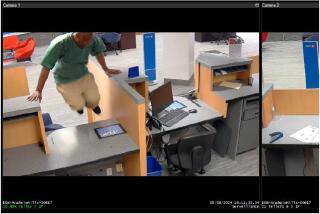Three-strikes inmate welcomes his freedom
- Share via
Upon embracing her son for the first time in 13 years, Lois Taylor fingered the gray strands in his unkempt beard, tears welling up in the corners of her eyes.
“Stop crying, Mom,” her son, Gregory, whispered into her ear. “It’s over. I’m out.”
Gregory Taylor, who was serving a 25-years-to-life prison sentence for a three-strikes offense, walked out of a downtown Los Angeles jail Thursday a free man. Once outside, Taylor, now 48, looked up at the cloudless blue sky and took a couple of deep breaths.
A judge granted a petition for his release Monday, finding that because of his character, difficult youth and mental health problems he fell “outside the spirit of the three-strikes law.” Taylor was a homeless man and drug addict when he was caught trying to pry open the doors to a church kitchen in 1997. He told the arresting officers that he wanted something to eat.
His two prior strikes, from more than a decade earlier, were a purse snatching and an unarmed, failed attempt at a street robbery to support his drug habit.
Over the years, his case came to exemplify the disproportionate sentences doled out as a result of California’s three-strikes law. His case was taken up earlier this year by two law students working on a Stanford project helping three-strikes inmates.
Waiting for her son’s release on the sidewalk outside the Twin Towers jail, Lois said the family would head straight to her Los Angeles home, where she would make him a home-cooked feast.
“I’m going to feed my baby,” she said, joyfully adding that she would make for him “whatever his little heart desires.” He liked soul food, she recalled.
The family never went to visit Taylor in his San Luis Obispo prison because he asked them not to, but she spoke to him on the phone every week, she said. She was relieved the hefty collect-call phone bills will be no more.
Taylor walked out to a gray lobby area of the jail’s inmate reception center wearing jeans hanging loose on a lean frame and a checkered button-down shirt. He pulled on bright white new sneakers his youngest brother, Michael, had gotten him.
At a brief news conference, Taylor said he was glad to be with his family and enjoying Southern California’s weather. He will be working with Michael, who runs a food pantry in Pomona, his family said.
To critics who question whether he will be able to live a law-abiding life on the outside, he asked that they “just believe and have faith.”
One of those critics, the original prosecutor on the case, said Thursday that although he believes Taylor has served enough prison time, the facts have been distorted over the years by advocates appropriating Taylor’s story to further their agenda.
“Obviously we could never go into the mind of Mr. Taylor, but I think that the facts strongly suggest that the motivation wasn’t for food,” said Dale Cutler, who retired from the Los Angeles district attorney’s office in 2004. Cutler said he still believes Taylor was trying to break into the church to steal money or valuables.
“This has become a cause célèbre, a useful tool,” he said. “Hopefully these people who have championed his cause will find some way to direct him to get help.”
victoria.kim@latimes.com
More to Read
Sign up for Essential California
The most important California stories and recommendations in your inbox every morning.
You may occasionally receive promotional content from the Los Angeles Times.














